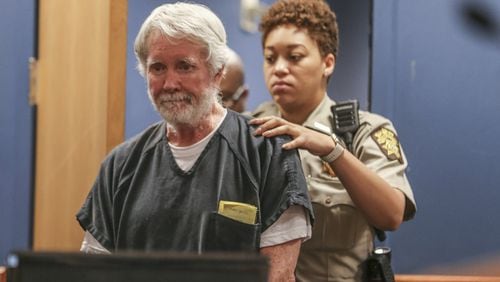Trying to take the offensive, defense attorneys for Claud "Tex" McIver have asserted that prosecutors illegally searched the properties of the Atlanta attorney accused of killing his wife over money. The attorneys are asking the judge to throw out any evidence from those searches.
McIver's attorneys said the Fulton County district attorney's office did not have the legal authority to search their client's Buckhead condo, his ranch in Putnam County or his Atlanta storage unit, according to several court motions filed in recent days.
For example, the attorneys said the DA's search warrant for the McIver condo was overly broad and the DA omitted important facts and promoted false assumptions in requesting the warrant. Had the judge known the truth, he would not have granted the warrant, said defense attorney William Hill.
Hill said the DA based the warrant on the belief that McIver’s wife, business executive Diane McIver, had written a second will.
"What they left out was that nobody had seen a second will and nobody had read it," Hill said.
The condo search is particularly important in that investigators seized a laptop computer, audio recordings, personal and business documents and a pistol. The pistol was not the one involved in the death of Diane McIver, but its presence there was a violation of McIver’s bond. That led to him being sent back to jail.
McIver has said he shot his wife accidentally while they were driving near Piedmont Park on Sept. 25. He said he pulled a gun from the center console of the SUV when he thought they were passing through a dicey part of Atlanta. Then, he said, he dozed off in the backseat and was jarred awake, leading him to inadvertently pull the trigger.
Prosecutors have charged the 74-year-old attorney with malice murder, felony murder, possession of a weapon and three counts of attempting to influence witnesses.
A spokesman for the DA declined to comment Monday on the motions, which were obtained by The Atlanta Journal-Constitution and Channel 2 Action News.
Hill also pointed to evidence that the DA’s office obtained during a Feb. 1 visit to the McIvers’ ranch in Putnam County. He said they had no warrant, and that the worker who let them on the farm did not have the authority to do so.
McIver’s attorneys filed motions Monday challenging the use of their client’s phone calls from jail, asserting that the monitoring of such calls is for jail safety and to ensure no contraband comes into the facility. The monitoring should not be used to produce evidence for a prosecution, they said.
Esther Panitch, a defense attorney who has been following the case, said these motions are standard practice for defense attorneys.
"They are throwing a lot of things at the wall in the hope that something sticks," said Panitch, who is not involved in the case.
In addition, the hearings that will occur on these motions will allow the defense to question people who might be called to testify at trial, possibly giving them some advanced information, she said.
In general, such motions to suppress evidence can also point to evidence that the defense does not want a jury to see, Panitch said.
Hill, McIver's attorney, said, "In this case, I'm not trying to hide anything. I'm interested in protecting the constitutional rights of my client."
Prosecutors allege that McIver had a financial motive for killing his wife. They have suggested that Diane McIver had a second will that was not as generous to her husband. But there has not been any evidence made public that they have found such a document.
About the Author






